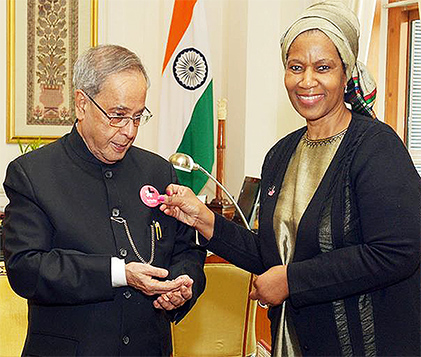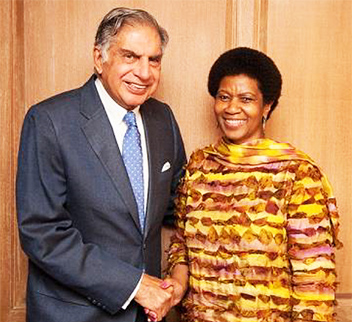Executive Director Makes Waves in India
Date:
On her first official visit to India as Executive Director of UN Women, Ms. Phumzile Mlambo-Ngcuka made waves around the South Asian country, meeting with governmental officials, UN partners, civil society, private sector and grassroots organizations.
For nearly one week, from 8-12 November, the Executive Director emphasized the importance of public safety legislation for women, women’s economic empowerment and political participation – and the importance of men and boys being involved in achieving gender equality and the empowerment of women.
A Presidential HeForShe

A major focus of the Executive Director’s visit was her participation in the 2nd MenEngage Global Symposium on engaging Men and Boys for Gender Justice. At the Global Symposium, the Executive Director emphasized that if we are to achieve gender equality, men and boys must take responsibility, and work side-by-side with women to redress dynamics that hinder progress. The Symposium resulted in the Men and Boys for Gender Justice Delhi Declaration and Call to Action.
Engaging and Encouraging Stakeholders

One of the Executive Director’s top priorities in India was to visit UN Women’s programmatic presence on the ground and to engage and encourage civil society organizations, women’s grassroots organizations and women’s leaders. Ms. Mlambo-Ngcuka spoke with key UN Women partners, including rural tech gurus, New Delhi’s Safe Cities Programme partner Jagori, and New Delhi Civil Society. Interactions such as these remain indispensable in ensuring that the agency and voice of women are recognized and respected around the globe.
Private Sector: A key stakeholder
The Executive Director also met with Ratan Tata, a renowned leader in the business world and Chairman Emeritus of Tata Sons, the holding company of the Tata Group. It was one of many meetings held with senior ministers, civil society and media leaders, donors and the private sector. Ms. Mlambo-Ngcuka wants to emphasize that India - as the world's largest democracy - has a leading role to play in helping to create more just societies.
Related link: